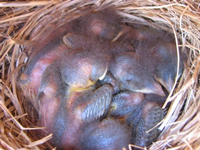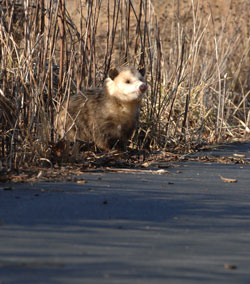Vol. 3 Issue 2, Spring 1998
By Leslie McCasker
Handling the most common types of spring encounters with wildlife

Baby Bluebirds
Photo by Nicole Hamilton
If possible, avoid cutting down trees or shrubs in the spring. Also avoid the use of harmful sprays on your trees and shrubs — many wild animals call this home.
If animals are nesting in and around your house and garden, try to tolerate them until nesting season is over. You can do the necessary repairs to prevent their return after the nesting season.
Their chances of survival are very slim if you displace them and their mother.
Animals will continue to care for their young even after humans have touched them. If you find a nestling animal, return it to its nest if it is healthy. The parents will not desert it. Do not, however, willfully disturb nests. The scent you leave can attract predators.
Young birds leave the nest before they can fly well. Parent birds continue to care for their young after they leave the nest. If you find a fully feathered young bird that does not yet fly well and is in immediate danger from people or pets, place it in a nearby bush or tree. The parent birds will find it.
If young mammals become separated from their mother, the mother will retrieve them. Observe from a distance for several hours before attempting to rescue young mammals.
Young rabbits leave their nest and their mother when they are the size of a chipmunk. If you find a tiny rabbit whose eyes are open and whose ears are standing up, it is not an orphan. Leave it alone. Young rabbits whose eyes are not yet open can be replaced in their nests. You will never see Mother Rabbit – she feeds her young infrequently and usually during the night.
Pets are the prime cause of death to wildlife in the spring. Please keep your pets under your control. Its killing instincts are not its rights. Do not introduce domestic predators into our fragile natural environment.

Opossum
Photo by Nicole Hamilton
To avoid hitting animals with your car, drive carefully and be aware of what is ahead of you along the sides of the road. Wild animals do not know that cars can hurt them. Just because you think that an animal has seen your car, remember that the animal has no comprehension that your car will hurt it. Be prepared to slow down or stop if you can do so safely. Be especially careful around dusk and dawn when many animals are the most active.
Opossums that are hit by cars may have young in their pouches. Please rescue these legitimate orphans.
If you find an injured animal, think of your safety first. Cover the animal with a box if it needs protection. Then call a wildlife caregiver to determine how to safely rescue it. All injured animals can cause injury or may carry diseases that are transmittable to you, so caution must be taken.
Do not attempt to rehabilitate wildlife on your own. The dietary, housing and behavioral needs of wild animals are quite specific. Both orphaned and injured wild animals deserve the proper supportive and medical care. To possess any wild animal or bird without a permit is against state and federal law.

